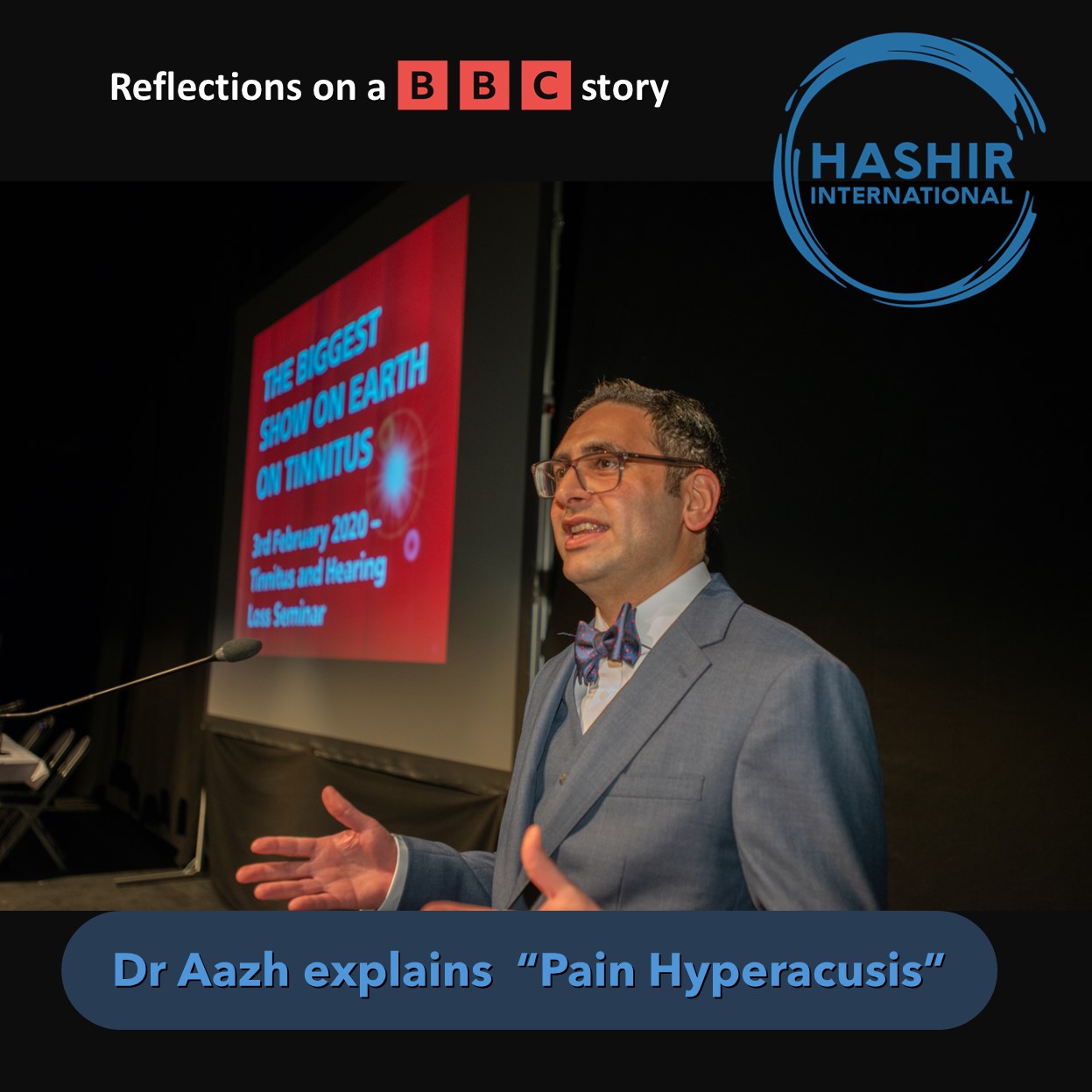February 21, 2024 at 5:22 pm

Dr Aazh explains the implications of “pain hyperacusis” which is characterized by experiencing pain at lower sound levels than listeners with no hyperacusis would. Hyperacusis was featured in a recent BBC article.
The sensation of pain or physical discomfort combined with the emotion of fear, and in some situations anger, are dominant characteristics of hyperacusis. Individuals with hyperacusis often perceive certain everyday sounds as too loud or even painful in a way that it causes significant distress and impairment in their social, occupational, recreational, and other day-to-day activities. Majority of people with severe hyperacusis also experience various forms of mental illness such as generalised anxiety disorder, depression, health anxiety, social anxiety, panic disorder or obsessive-compulsive disorder. Therefore, for people with severe hyperacusis, it is important to see a mental health professional as well as audiology and Ear-Nose-Throat (ENT) specialists.
A patient in our clinic said:
“From that point my life has become very restricted since most everyday sounds are uncomfortably loud and painful for me. I simply cannot tolerate traffic noise and travelling on tubes, buses, or cars. Even birds singing or dogs barking are painful. Life is a nightmare. I am constantly scared that noises are going to further damage my ears and worsen my symptoms. I feel that that I am the prisoner of this. I cannot do the things that I like to do, I have no control, and I cannot lead a normal life.”
Over the last two decades, researchers at Hashir International Institute have extensively studied assessment and management of hyperacusis in children and adults. In collaboration with University of Cambridge, Kings College London, and the Royal Surrey NHS Foundation Trust, they developed a brief tool that can reliably distinguish between different forms of hyperacusis. This is called Sound Sensitivity Symptoms Questionnaire (SSSQ). Click here to use SSSQ.
 Our Director, Dr Hashir Aazh said:
Our Director, Dr Hashir Aazh said:
“Based on our research, patients with pain hyperacusis experience extreme discomfort even when listening to the sound level of a whisper in a quiet library. Although not everyone with hyperacusis experiences physical discomfort or pain, for patients with pain hyperacusis, almost all day-to-day environmental sounds are perceived as uncomfortably loud. This can lead to isolation and poor quality of life. Patients with pain hyperacusis need social care, adaptations in their home or workplace, as well as clinical treatment.”
Joanna Barker, Specialist Audiologist, adds:

“We have a multi-disciplinary team of audiologists, psychologists, occupational therapists, and patient support officers, that can provide comprehensive care for patients with pain hyperacusis. We often adjust our sessions and methods of communication to suit the individual who experiences pain hyperacusis. For instance, for some patients we have used written communication instead of talking to them, at least at the beginning of their therapy. It is very rewarding to see that a patient who no longer can work due to hyperacusis and cannot even tolerate their therapist’s voice, or in some cases their own voice, progresses to a point that is ready to return to work. We also support them in their phased return to work starting from working from home and gradually increasing the physical attendance. Hyperacusis and noise sensitivity are chronic conditions and require long-term management.”
Hyperacusis can affect people’s physical health and many patients with pain hyperacusis also suffer from headaches. Understanding the impact of hyperacusis on physical health is critical in supporting patients. They often feel that doctors do not believe them when they say that noise hurts their ears. Patients learn how to manage bodily sensations such as pain, ear fullness, and headaches during their therapy. Studies conducted at Hashir International Institute show that on average there are significant improvements in the measures related to severity of sound sensitivity, hyperacusis, and symptoms of anxiety and depression following the therapy. Learn more about hyperacusis and its treatment by clicking here.
To read the BBC article on pain hyperacusis visit: https://www.bbc.co.uk/news/uk-england-merseyside-68285642
For further information, please contact:
Hashir International Institute, 167-169 Great Portland Street, 5th Floor, London, W1W 5PF
Hashir International Institute, 54 Quarry Street, Guildford. GU1 3UA
admin@hashirtinnitusclinic.com
About Hashir International:
Hashir International is an independent research institute and treatment centre dedicated to improving the diagnostic process and rehabilitation programs for patients experiencing misophonia, tinnitus and hyperacusis. They offer specialist training courses, ethical review of research proposals, research design, research sponsorship, and supervising MSc and PhD students.